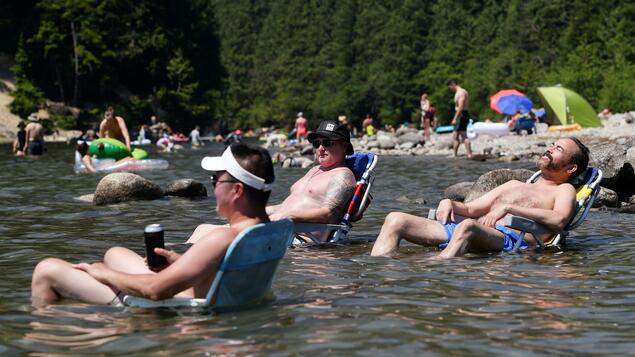Lytton is a small village in Canada. Founded in the mid-19th century gold rush, it is surrounded by mountains in the valley of the Fraser River, 260 kilometers northeast of Vancouver. 300 people do not live here.
Despite this, the community is now world famous, which is not really commendable. No one would expect this part of Canada, which is known for really cold temperatures, to be hotter one day than the desert city of Dubai. Measured 49.5 degrees on Tuesday – a new record for everyone in Canada. The maximum was announced two days earlier.
Jeff Fordelli says on a morning show on the television station CBS that this is almost unbelievable even for a meteorologist. He explains “crazy weather” by a strong “atmospheric sealing system” in which heat is generated over a large area. Armel Castellon, a meteorologist with the Canadian Environment Agency, said: “There is no exaggeration in the heat.
[Wenn Sie alle aktuellen Nachrichten und Hintergründe live auf Ihr Handy haben wollen, empfehlen wir Ihnen unsere App, die Sie hier für Apple- und Android-Geräte herunterladen können.]
In fact, the ministry has issued a warning of a “continuous, dangerous and historic heat wave” for at least several provinces last week. The northwest of the United States is also affected. The cities of Portland, Oregon and Seattle have recorded the highest temperatures since the beginning of the 1940s.
Nearly 500 deaths
The problem is exacerbated by the fact that people in the area are not used to such heat waves. For example, the average maximum daily temperature in the village of Lytton is 24.3 degrees in July. Unlike in the south or southwest of the United States, not all buildings in the north and Canada are air-conditioned. So in many places, people are looking for shelter in underground garages or air-conditioned cars. The elderly, children and the homeless are particularly concerned.
Castellon talks about a “killer event” because emergency services already report a significant increase in deaths. In the province of British Columba, 486 deaths have already been reported, otherwise the average is 130. This number is likely to increase.
In city parks, lawn sprinklers run non-stop – not only watering lush areas, but also allowing people to cool off.
“We are in the middle of the hottest week in British Columbia ever seen,” said Prime Minister John Horgan. He called on people to pay attention to who might be at risk. Ambulance services are constantly called because people are broken by the heat. The situation is deteriorating in some places due to wildfires which are deteriorating air quality.
Florian Impery, a meteorologist with the German Meteorological Service, sees the great danger posed by such heat waves to nature and humans. “We are dealing with a strong high pressure influence here, and in addition there is currently no high levels of solar radiation and rainfall,” he told Takespeekal.
These are the waves of the jet stream known as the Omega weather condition. “Such weather conditions can last for days or even weeks.” This can be especially problematic for the elderly, but agriculture is also naturally affected by such conditions.
While there was always the Omega situation between April and September, Imperi compares the situation to the summer of 2018 in Germany. “At that time, an average more people died here in the summer,” he says. Vancouver, the largest city in the province of British Columbia, is geographically approximately at the same level as Frankfurt am Main.
[Mehr zum Thema: Wetter oder Klima? Eine deutsche Forscherin will eines der größten Klima-Rätsel lösen]
The situation in Canada is far more dramatic than it is now in Germany. Even in the famous Jasper National Park the temperature can drop below 40 degrees. According to meteorologists, the weather event that keeps such hot air for so long occurs very, very rarely – only once every few thousand years, according to the Washington Post. That is why there is a heated debate on social media about whether to draw a link to the climate crisis.
Biden addresses climate suspects
Paradoxically, US President Joe Biden commented on the debate over 46 degrees Celsius in Portland and addressed the suspects directly. “Don’t worry, there’s no global warming,” he explains with a smile. “not that. That is the fruit of our imagination. “
According to experts, the matter is clear anyway. “It’s hard to point to a heat wave for climate change,” says scientist Florian Impery. “But due to man-made climate change, these types of heat waves have increased significantly, especially in terms of intensity.” Or, as Canadian meteorologist Jeff Fordelli puts it: “Climate change is not only impossible, it is possible.”


